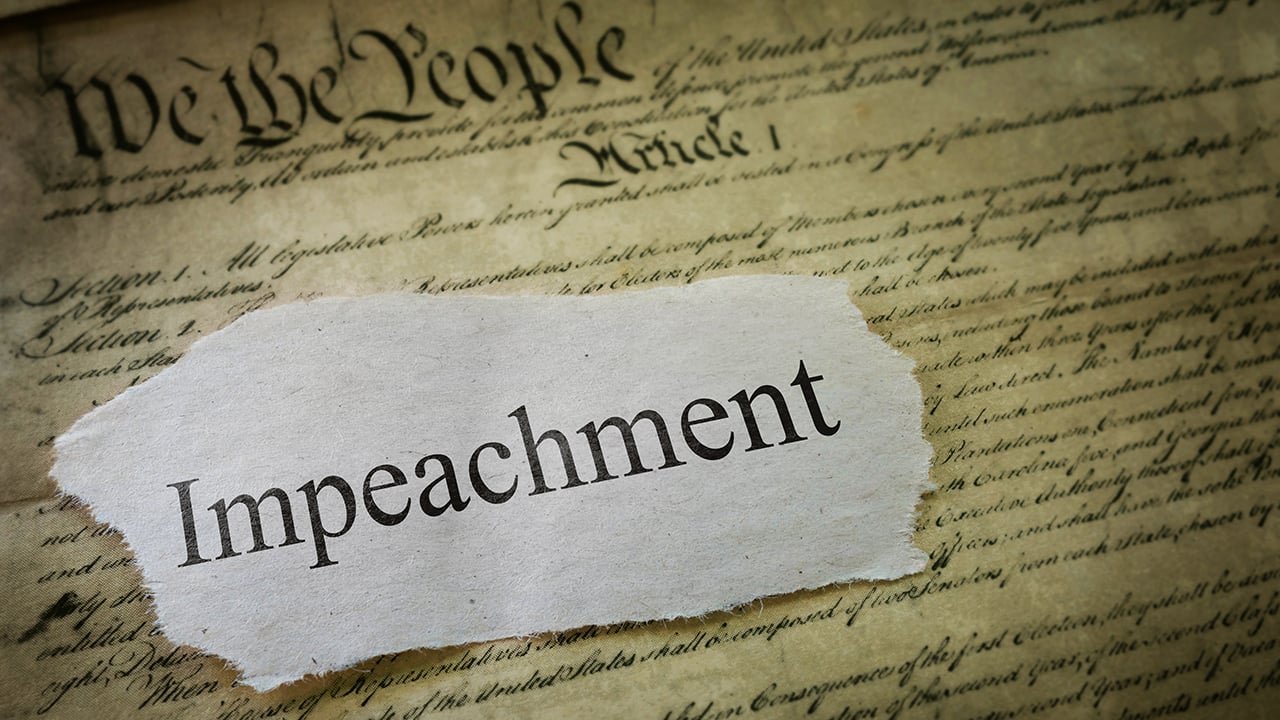
One of the reasons that Republican activists are becoming frustrated with Speaker of the House Kevin McCarthy and leaders in the House of Representatives is their unwillingness to use one of their most potent Constitutional powers — the Power of Impeachment. Democrats in the House of Representatives were not afraid to impeach President Trump (twice) for phony reasons, even though they were certain that the Senate would not convict. But many Republicans fear impeaching Biden despite solid evidence of “high crimes and misdemeanors” because they believe the Senate will not convict. What’s going on here? Why are Republicans so timid about using the impeachment power?
President Trump was inaugurated as the nation’s 45th President on January 20, 2017, and before he left office four years later, he had been impeached twice. President Trump’s first impeachment trial began on December 18, 2019, and he was acquitted on February 5, 2020. Fully 67 votes were required in the Senate to convict, but only 47 and 48 Senators voted “guilty” on the two Articles of Impeachment. (The one Republican Senator who voted to convict was Mitt Romney (R-UT).)
The first failure to convict didn’t stop House Democrats from impeaching him again on January 13, 2021 — only one week before his term of office was to have expired. President Trump’s second trial did not actually begin until after he had left office and become a private citizen. He was acquitted on February 13, 2021, when 57 senators voted “guilty,” but that was still well short of the 67 votes needed to convict. (This time, seven Republican Senators voted to convict: Richard Burr (R-NC), Susan Collins (R-ME), Bill Cassiday (R-LA), Lisa Murkowski (R-AK), Mitt Romney (R-UT), Ben Sasse (R-NE), and Pat Toomey (R-PA).)
After avoiding the issue of impeachment of President Biden for most of 2022 and thus far in 2023, the Republican establishment which controls the House of Representatives have at last begun to at least consider impeachment proceedings. It had become increasingly difficult even for the moderate Republican leadership to avert their eyes from the flood of revelations that Biden lied about supposedly not being involved with his son Hunter’s corrupt business dealings with the Ukrainians and Chinese Communist Party apparatchiks. On July 25, 2023, Speaker McCarthy observed: “this is rising to the level of impeachment inquiry, which provides Congress the strongest power to get the rest of the knowledge and information needed.”
Others in Congress have been far more bold than the Speaker. On August 11, 2023, Congressman Greg Steube (R-FL) became the most recent Republican to file articles of impeachment against Biden. “It’s long past time to impeach Joe Biden,” said Steube, listing just some of his reasons:
He has undermined the integrity of his office, brought disrepute on the Presidency, betrayed his trust as President, and acted in a manner subversive of the rule of law and justice at the expense of America’s citizens. The evidence continues to mount by the day — the Biden Crime Family has personally profited off Joe’s government positions through bribery, threats, and fraud. Joe Biden must not be allowed to continue to sit in the White House, selling out our country.
- House Republicans should initiate impeachment proceedings against President Biden,” said Rep. Jim Banks (R-IN). “Joe Biden was trading his personal influence to enrich himself and his family and must be held accountable for selling out America.”
- Rep. Claudia Tenney (R-NY) agreed, “Joe Biden committed crimes in plain sight….It’s time for impeachment.”
- “Biden NEEDS to be impeached. He is compromised and his son is selling access to him,” said Rep. Anna Paulina Luna (R-FL).
- “The House of Representatives … shall have the sole Power of Impeachment.” Art. I. sec. 2 (emphasis added).
- “The Senate shall have the sole Power to try all Impeachments. When sitting for that Purpose, they shall be on Oath or Affirmation. When the President of the United States is tried, the Chief Justice shall preside: And no Person shall be convicted without the Concurrence of two thirds of the Members present.” Art. I, sec. 3, cl. 6 (emphasis added).
- “Judgment in Cases of Impeachment shall not extend further than to removal from Office, and disqualification to hold and enjoy any Office of honor, Trust or Profit under the United States: but the Party convicted shall nevertheless be liable and subject to Indictment, Trial, Judgment and Punishment, according to Law.” Art. I, sec. 3, cl. 7.
- “The President, Vice President and all civil Officers of the United States, shall be removed from Office on Impeachment for, and Conviction of, Treason, Bribery, or other high Crimes and Misdemeanors.” Art. II, sec. 4 (emphasis added).






